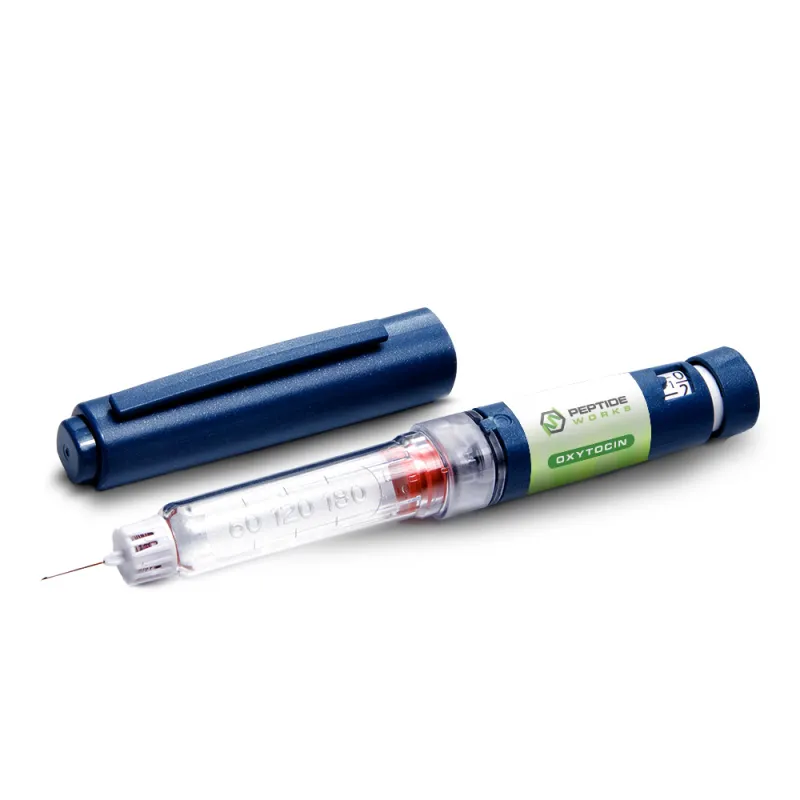
PROMO!
First order? Get 10% OFF with this code: 1storder
Written by

Oxytocin has often been called the “love hormone,” but its role in childbirth is far more complex than just supporting emotional bonds. It is central to labor, recovery, and the way mothers and babies connect in the hours and days after birth. In hospitals, doctors may use a synthetic form of oxytocin to help start or support delivery, but this is a carefully controlled medical process under professional supervision.
Oxytocin supplements sold for research are very different. They are not the same as the medical-grade versions used in maternity care. At Peptide Works, our focus is on providing oxytocin peptides for scientific study. Researchers examine how oxytocin functions in the body, including its influence on bonding, stress, and emotional response.
One of the most important ways oxytocin shows its impact after childbirth is through the early bond between mother and baby.
Explore Oxytocin Peptide from Peptide Works, a hormone peptide that supports uterine contractions, bonding, and lactation in postpartum recovery studies.

Oxytocin rises sharply after childbirth and helps a mother connect with her baby a response that has led many to call it the “love hormone.” This is seen in the first hour after labor, when skin-to-skin contact lowers stress and builds trust between them. Many parents describe this early bonding as a powerful emotional moment.
Researchers use oxytocin supplements to study how this hormone shapes bonding. Findings show that oxytocin supports calm feelings, eye contact, and gentle touch. These responses make it clear why oxytocin is called the “bonding hormone” and why it is a focus of ongoing research on attachment and early development.
In addition to its role in bonding, oxytocin supplements also affect how mothers handle the stress and emotional changes that follow labor.
Oxytocin plays a role in calming the body after the intensity of labor. It supports recovery by lowering stress hormones and helping new mothers feel more at ease during the early postpartum hours. This effect can make the transition from delivery to care for the newborn less overwhelming.
Researchers often look at oxytocin supplements to understand how the hormone influences emotional stability after birth. Results show that oxytocin may reduce feelings of anxiety and help regulate mood. This interest has made oxytocin a topic in searches about postpartum stress, maternal adjustment, and emotional health.
Beyond emotional support, oxytocin also takes on a key role in breastfeeding, where its effects are both physical and calming.

Oxytocin helps mothers with the milk let-down reflex after birth. When a baby begins to suckle, the hormone signals small muscles around the milk glands to contract. This action moves milk forward, making feeding easier for the infant and more comfortable for the mother.
Because of this reflex, oxytocin is often called the “milk ejection hormone.” It explains why breastfeeding can feel calming and why early nursing is linked with lower stress. The hormone’s role in lactation is one of the key ways it supports both recovery and infant development during the postpartum period.
Its influence goes beyond feeding, however, as oxytocin also contributes directly to a mother’s physical recovery after birth.
Oxytocin causes the uterus to contract after delivery, helping it return to its pre-pregnancy size. These contractions reduce heavy bleeding and lower the risk of complications such as postpartum hemorrhage. This natural response is one of the most important ways the body protects maternal health in the days following birth.
Oxytocin supplements are investigated for their role in supporting uterine recovery and blood flow regulation. The hormone’s effect on muscle tone and healing makes it a key focus when examining how the body restores balance during the postpartum period.
This connection between oxytocin and uterine strength also explains its critical role in preventing dangerous blood loss.

Oxytocin contracts the uterine muscle right after birth, which clamps blood vessels and reduces bleeding. This effect makes it the first-choice medicine to prevent postpartum hemorrhage, a leading cause of maternal complications worldwide. Clinical guidance recommends a standard dose of 10 IU given either through a vein or muscle to lower the risk of heavy bleeding.
Evidence shows that oxytocin given by IV may act faster and be more effective than IM injections, while both routes are considered safe. Oxytocin Supplements are studied to understand these uterine effects in greater depth, helping researchers explore ways to improve maternal safety during the postpartum period.
Even with its life-saving role in preventing hemorrhage, oxytocin also influences the everyday experiences of mothers during recovery, including how they manage postpartum pain.
After childbirth, many mothers feel cramping known as afterpains. These cramps occur as oxytocin signals the uterus to contract during healing. The sensation often grows stronger while breastfeeding, since nipple stimulation triggers a rise in oxytocin release.
Although uncomfortable, these contractions help limit bleeding and support recovery. At Peptide Works, we provide oxytocin supplements for research so scientists can explore how the hormone affects postpartum pain patterns and uterine healing. These insights are important for understanding how oxytocin balances short-term discomfort with long-term maternal health benefits.
Taken together, oxytocin’s impact stretches across every stage of childbirth and recovery, which is why researchers continue to study its potential.
Oxytocin influences many parts of childbirth, from bonding and stress relief to breastfeeding, uterine recovery, hemorrhage prevention, and postpartum pain. Its impact highlights why this hormone remains so important in maternal health.
At Peptide Works, we provide oxytocin supplements for research, supporting continued exploration into these vital areas. The future of oxytocin supplements holds promise, as ongoing studies may uncover new ways to improve recovery and safety for mothers and infants around the world.
All peptides and compounds mentioned are strictly for research purposes only and not for human use.
[1] Oladapo OT, Okusanya BO, Abalos E, Gallos ID, Papadopoulou A. Intravenous versus intramuscular prophylactic oxytocin for the third stage of labour. Cochrane Database Syst Rev. 2020 Nov 9;11(11):CD009332.
[2] Walter MH, Abele H, Plappert CF. The Role of Oxytocin and the Effect of Stress During Childbirth: Neurobiological Basics and Implications for Mother and Child. Front Endocrinol (Lausanne). 2021 Oct 27;12:742236.
[3] Carter CS. Oxytocin and love: Myths, metaphors and mysteries. Compr Psychoneuroendocrinol. 2021 Dec 27;9:100107.
[4] Uvnäs Moberg K, Ekström-Bergström A, Buckley S, Massarotti C, et al. Maternal plasma levels of oxytocin during breastfeeding-A systematic review. PLoS One. 2020 Aug 5;15(8):e0235806.
ALL CONTENT AND PRODUCT INFORMATION AVAILABLE ON THIS WEBSITE IS FOR EDUCATIONAL PURPOSES ONLY.
DISCLAIMER: These products are intended solely as a research chemical only. This classification allows for their use only for research development and laboratory studies. The information available on our Peptide Works website: https://peptide-works.com/ is provided for educational purposes only. These products are not for human or animal use or consumption in any manner. Handling of these products should be limited to suitably qualified professionals. They are not to be classified as a drug, food, cosmetic, or medicinal product and must not be mislabelled or used as such.
Peptide Works
Related Articles

What are the Best Cognitive Peptides?
Cognitive peptides are short chains of amino acids that researchers are exploring for their potential effects on brain function. They

Achieving increased skin pigmentation without prolonged sun exposure has been demonstrated with Melanotan peptides in research. Two commonly studied options,

Can PTD-DBM Hair Growth Peptide Stop Balding?
Hair thinning and balding affect millions worldwide, often leading to frustration and limited options. This challenge has driven researchers to